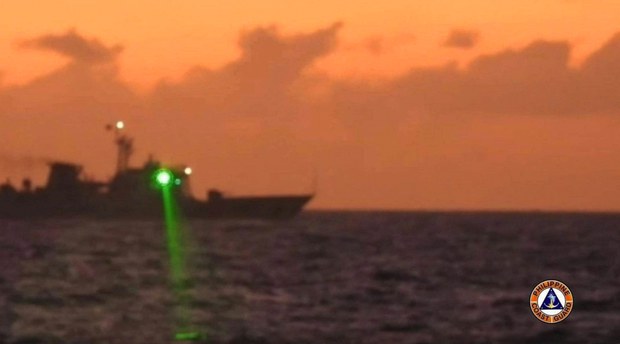Washington backs Manila as Philippines lodges laser protest with China
Share

Chinese Coast Guard vessel 5205 allegedly pointing laser at BRP Malapascua in this handout photo taken on Feb. 6, 2023.
The U.S. has expressed support for the Philippines over the laser incident in the South China Sea, condemning China’s “provocative and unsafe” conduct.
The Philippine Department of Foreign Affairs on Tuesday also lodged a diplomatic protest with the Chinese Embassy in Manila.
On Monday, the Philippine Coast Guard (PCG) accused China of performing dangerous maneuvers and pointing a laser at one of its vessels, the BRP Malapascua, causing temporary blindness to the crew.
The incident took place on Feb. 6 near the Second Thomas Shoal in the Spratlys, when the Philippine vessel was attempting to deliver food and supplies to the troops stationed there.
Beijing rejected the accusation, saying the Philippine ship “intruded into the waters” off the Spratly islands “without Chinese permission” and the Chinese Coast Guard (CCG) “acted in a professional and restrained way.”
China claims sovereignty over most of the South China Sea, including the two main archipelagos of Paracels and Spratlys that it calls Xisha and Nansha, respectively.
An U.N. tribunal in a legal case brought by the Philippines in 2016 ruled that the Chinese claims in the South China Sea were baseless and illegal but Beijing has so far refused to acknowledge the ruling.
‘Stand with our allies’
A U.S. State Department statement on Monday said that “the United States stands with our Philippine allies in the face of the People’s Republic of China (PRC) Coast Guard’s reported use of laser devices against the crew” of the Malapascua.
“The PRC’s conduct was provocative and unsafe, resulting in the temporary blindness of the crewmembers of the BRP Malapascua and interfering with the Philippines’ lawful operations in and around Second Thomas Shoal,” it said.
The statement by spokesperson Ned Price reaffirmed that an armed attack on Philippine armed forces, including the Coast Guard in the South China Sea, would invoke U.S. mutual defense commitments under the 1951 U.S.-Philippines Mutual Defense Treaty.
Meanwhile, the Philippine Foreign Ministry said it had filed a diplomatic protest over the laser incident to the Chinese Embassy in Manila on Tuesday.
The diplomatic protest “condemned the shadowing, harassment, dangerous maneuvers, directing of military-grade laser, and illegal radio challenges by CCG vessel 5205 against PCG vessel BRP Malapascua.”
Spokesperson Teresita Daza said those “acts of aggression” happened just after the visit by the Philippine President Ferdinand R. Marcos Jr. to China, “during which he and Chinese President Xi Jinping agreed to manage maritime differences through diplomacy and dialogue, without resorting to force and intimidation.”
Daza called on Beijing “to comply with its obligations under international law” and direct its vessels to stop aggressive activities against Philippine vessels.
On Feb. 21-Feb. 23 China and the ASEAN group of Southeast Asian nations are scheduled to hold a meeting to review the implementation of the so-called Declaration of the Conduct of Parties (DOC) in the South China Sea.
The DOC is a risk control agreement signed in 2002 by Beijing and ASEAN countries to prevent conflicts in the disputed waters.
It is unclear whether the laser incident will be discussed at the meeting.
BenarNews staff in Manila contributed to this report.
BenarNews is an RFA-affiliated news organization.







